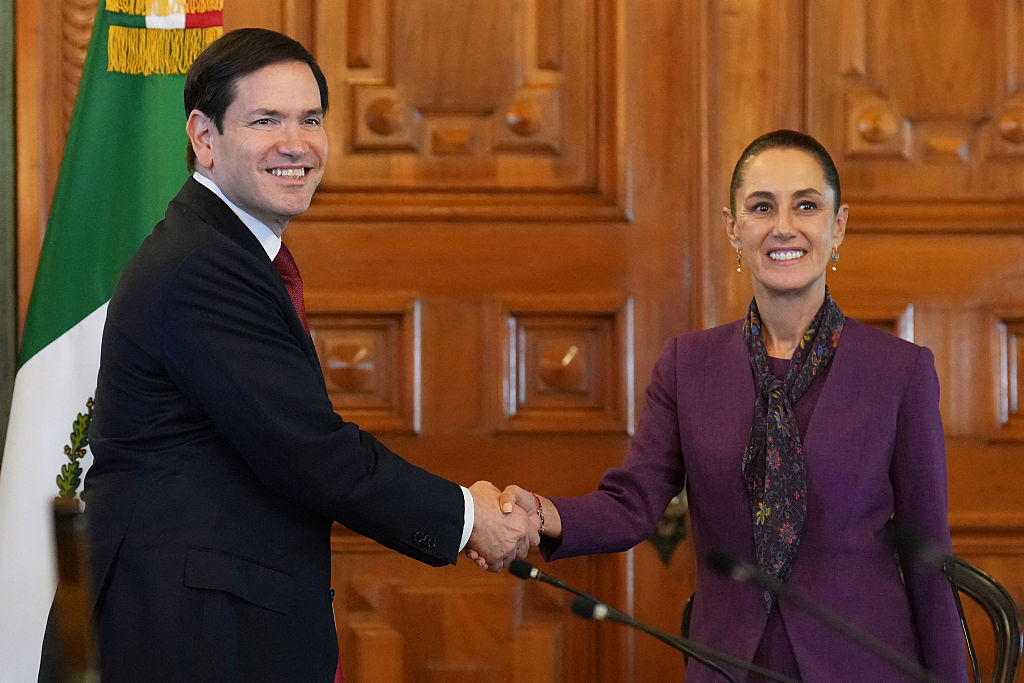“Never in the history of either country have we seen the level of cooperation that we are seeing between our two countries.”
Expect hyperbole like this from Donald Trump posting at a like-minded conservative government. Expect it less so from his hard-talking Secretary of State, Marco Rubio, who spoke in glowing terms about Claudia Sheinbaum’s left-wing government in Mexico. “Right now,” he continued at a press conference in Mexico City earlier this week, “there is no other government that is cooperating as much with us against criminality than the Mexican government. We are very thankful to them.”
[time-brightcove not-tgx=”true”]
Read More: The Meaning of Mexico’s First Female President
Sheinbaum, a so-called “Trump whisperer,” has spent months walking a tightrope between standing up to the U.S. and yielding to its demands on a range of issues. But when it comes to the drug cartels, the script has flipped. Sheinbaum and Rubio appear to have agreed to a common path, and now need the rest of their respective countries to walk down it with them.
Rubio’s visit marks an important shift in U.S.-Mexico ties. Until recently, things were not looking so rosy. The U.S. government had unilaterally crippled Mexican banks and there were growing calls in Washington for U.S. strikes on “narco-terrorist organizations” in Mexico.
The bonhomie is also notable considering the different approach taken elsewhere. A day before Rubio’s visit a U.S. strike blew up an alleged drug trafficking boat from Venezuela, killing 11 people. Although Rubio warned such strikes “will happen again” he uttered the words “shared responsibility” and “sovereignty” repeatedly when it came to Mexico. The message seemed to be that each country would do its part in tackling cartels operating on their side of the border, and that unilateral U.S. strikes on Mexican soil were off the table.
Both the U.S. and Mexican governments have long been keen to counter the powerful cartels and address criminality. But domestic politics in both countries have got in the way of deeper cooperation.
Last month, a potential disaster almost blew up in the Trump Administration’s face when the DEA announced “a major new initiative to strengthen collaboration … in the fight against cartels.” The comments may have appeared innocuous enough from a U.S. perspective, but they unleashed fury in Mexico City. Sheinbaum, looking visibly annoyed at a press conference, denied the agreement existed and said that her government did “not know why they put out this statement.”
The dilemma for the Sheinbaum Administration—which has focused far more on intelligence gathering than its predecessors—is that it probably does want U.S. help as violent crime remains a problem. Mexico is already working with U.S. intelligence gathering over Mexican territory in the form of drone surveillance, with the Sheinbaum government’s consent. But the pushback her Administration got when the flyovers came to the press’ attention shows how fraught the issue is.
The Trump Administration is also in a tricky spot. Domestic politics in the U.S. could have easily derailed cooperation. Key officials in Washington are adamant that the Mexican government cannot be trusted and that it may even be in league with the cartels. Trump himself has weighed in on the matter, saying in July that Mexican authorities are “petrified to go to work because the cartels have a tremendous grip on Mexico and the politicians and the people that get elected.”
Indeed, U.S. law enforcement and intelligence agencies have identified dozens of political figures as having ties to the drug trade. That includes leaders of Sheinbaum’s Morena party and several state governors. In October, for example, a former Secretary of Public Security from a previous administration was sentenced to 38 years in U.S. prison over cartel bribes. And last month, the drug kingpin Ismael Zambada García told a New York courtroom that he had been bribing Mexican politicians for years to operate freely there. The matter of cracking down on politicians linked to the cartels was reportedly a sticking point in the otherwise jolly Sheinbaum-Rubio meeting, according to La Politica Online.
A lack of trust in Mexican authorities is one reason why some in Washington have insisted on unilateral action. It was such an issue that the U.S. reportedly worked last year with the son of Sinaloa Cartel’s infamous leader, El Chapo Guzmán, to covertly render Zambada, a rival drug boss, to U.S. custody. Mexicans were furious by the apparent breach of sovereignty.
The view of Mexico as a lawless narco-state, echoed at times from Trump, has helped promote the idea that only one-sided U.S. military action can address criminality. But Rubio looks like a calming influence. This week’s summit suggests the U.S. is willing to give Mexico’s government the benefit of the doubt. And it certainly doesn’t hurt that Sheinbaum and Trump reportedly get along; they have spoken 14 times and he has called her an “amazing woman.”
The U.S. and Mexico are finding an unlikely partnership over the most politically sensitive issue. Critics of Sheinbaum will say that’s because she has quietly appeased Trump—curbing migrant flows, upping drug seizures, and shipping alleged cartel members off to the U.S.
Others, however, point out that if a deal can be reached on security, there is hope on other bilateral issues. The two countries are separately hammering out trade negotiations after Sheinbaum in July secured a 90-day delay on U.S. tariffs to all Mexican goods, alongside a more conciliatory message from Trump.
Cool heads, the unofficial motto of the Sheinbaum Administration’s approach to Trump, seem to be prevailing.

